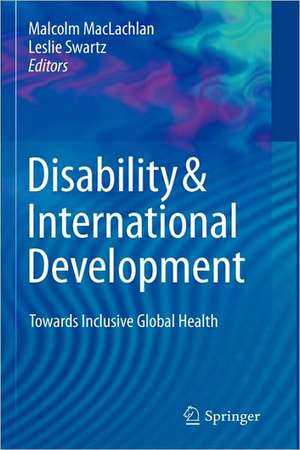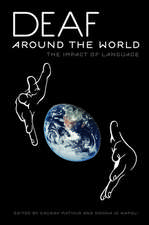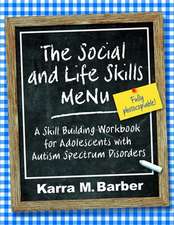Disability & International Development: Towards Inclusive Global Health
Editat de Malcolm Maclachlan, Leslie Swartzen Limba Engleză Hardback – 4 aug 2009
Each of the book’schapters spotlights a topic as representative of the enormity and immediacy of challenges to inclusive global health, including:
- The impact of international human rights law on domestic law and local traditions.
- The effect of failed states on the lives of people with disabilities.
- Empowerment and advocacy: disability organizations and movements.
- HIV/AIDS interventions with disabled persons.
- Assistive technologies in low-income countries.
- Strategies for improving the lives of children with disabilities.
| Toate formatele și edițiile | Preț | Express |
|---|---|---|
| Paperback (1) | 1091.35 lei 43-57 zile | |
| Springer – 28 noi 2014 | 1091.35 lei 43-57 zile | |
| Hardback (1) | 1098.27 lei 43-57 zile | |
| Springer – 4 aug 2009 | 1098.27 lei 43-57 zile |
Preț: 1098.27 lei
Preț vechi: 1156.07 lei
-5% Nou
Puncte Express: 1647
Preț estimativ în valută:
210.22€ • 228.42$ • 176.70£
210.22€ • 228.42$ • 176.70£
Carte tipărită la comandă
Livrare economică 21 aprilie-05 mai
Preluare comenzi: 021 569.72.76
Specificații
ISBN-13: 9780387938431
ISBN-10: 0387938435
Pagini: 218
Ilustrații: XXIII, 218 p.
Dimensiuni: 155 x 235 x 14 mm
Greutate: 0.52 kg
Ediția:2009
Editura: Springer
Colecția Springer
Locul publicării:New York, NY, United States
ISBN-10: 0387938435
Pagini: 218
Ilustrații: XXIII, 218 p.
Dimensiuni: 155 x 235 x 14 mm
Greutate: 0.52 kg
Ediția:2009
Editura: Springer
Colecția Springer
Locul publicării:New York, NY, United States
Public țintă
ResearchCuprins
From the Local to the Global: the Many Contexts of Disability and International Development.- The Effect of Failed States on the Well-Being and Lives of People with Disabilities.- The Impact of International Human Rights Law on the National Laws of Ethiopia from a Gender Rights and Disability Rights Perspective.- Building an Inclusive National Strategy for Disabled Children in Kyrgyzstan Through an Application of the BIAS FREE Framework.- Networking in Disability for Development: Introducing the African Network for Evidence-to-Action on Disability (AfriNEAD).- Building Disability Research Capacity in Low-Income Contexts: Possibilities and Challenges.- Empowerment, Advocacy and National Development Policy: A Case Study of Disabled Peoples’ Organizations in Bolivia.- Cultural Challenges in Piloting Disability Surveys in Papua New Guinea.- Disability and HIV/AIDS: A Key Development Issue.- Assistive Technology in Low-Income Countries.- Childhood Disability in Burkina Faso and Sierra Leone: An Exploratory Analysis.- Education, Disability, and International Development.- Listening to the Voices of Disability: Experiences of Caring for Children with Cerebral Palsy in a Rural South African Setting.
Notă biografică
Malcolm MacLachlan is Associate Professor at the Centre for Global Health and School of Psychology, Trinity College Dublin. His research focuses on psychosocial rehabilitation of physically disabled people, organizational aspects of international aid and development, and culture and health.
Leslie Swartz is Professor of Psychology at Stellenbosch University (South Africa) and an Honourary Research Associate at the Human Sciences Research Council. He holds a doctorate in Psychology from the University of Cape Town and is rated as an internationally rated scientist by the National Research Foundation of South Africa.
Leslie Swartz is Professor of Psychology at Stellenbosch University (South Africa) and an Honourary Research Associate at the Human Sciences Research Council. He holds a doctorate in Psychology from the University of Cape Town and is rated as an internationally rated scientist by the National Research Foundation of South Africa.
Textul de pe ultima copertă
Disability and International Development
Towards Inclusive Global Health
Edited by Malcolm MacLachlan & Leslie Swartz
One of the greatest challenges facing modern global health is how to include the most marginalized and impoverished people in international efforts to promote social and economic development. In Disability and International Development disability rights are situated within the broader context of global health and the need for much greater inter-sector collaboration. Reports from a broad cross-section of low- and middle-income countries—locales as diverse as Zimbabwe, Bolivia, Kyrgyzstan, and Papua New Guinea—move beyond surface discussions of "what is working" and "what shows promise" to discuss political and governance contexts, the roles of people with disabilities in research by outsiders, concurrent struggles (e.g., women’s or children’s rights), and instructive inroads made by community activists and national Disabled People’s Organizations. The results are provocative, and offer new lenses for viewing both the issues and the populations they affect.
Each of the book’s chapters spotlights a topic as representative of the enormity and immediacy of challenges to inclusive global health, including:
Towards Inclusive Global Health
Edited by Malcolm MacLachlan & Leslie Swartz
One of the greatest challenges facing modern global health is how to include the most marginalized and impoverished people in international efforts to promote social and economic development. In Disability and International Development disability rights are situated within the broader context of global health and the need for much greater inter-sector collaboration. Reports from a broad cross-section of low- and middle-income countries—locales as diverse as Zimbabwe, Bolivia, Kyrgyzstan, and Papua New Guinea—move beyond surface discussions of "what is working" and "what shows promise" to discuss political and governance contexts, the roles of people with disabilities in research by outsiders, concurrent struggles (e.g., women’s or children’s rights), and instructive inroads made by community activists and national Disabled People’s Organizations. The results are provocative, and offer new lenses for viewing both the issues and the populations they affect.
Each of the book’s chapters spotlights a topic as representative of the enormity and immediacy of challenges to inclusive global health, including:
- The impact of international human rights law on domestic law and local traditions.
- The effect of failed states on the lives of people with disabilities.
- Empowerment and advocacy: disability organizations and movements.
- HIV/AIDS interventions with disabled persons.
- Assistive technologies in low-income countries.
- Strategies for improving the lives of children with disabilities.
Caracteristici
Illuminates the social context of disability and the mechanisms for alleviating the problems of disabled people in low- and middle-income countries












